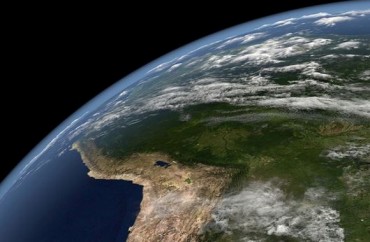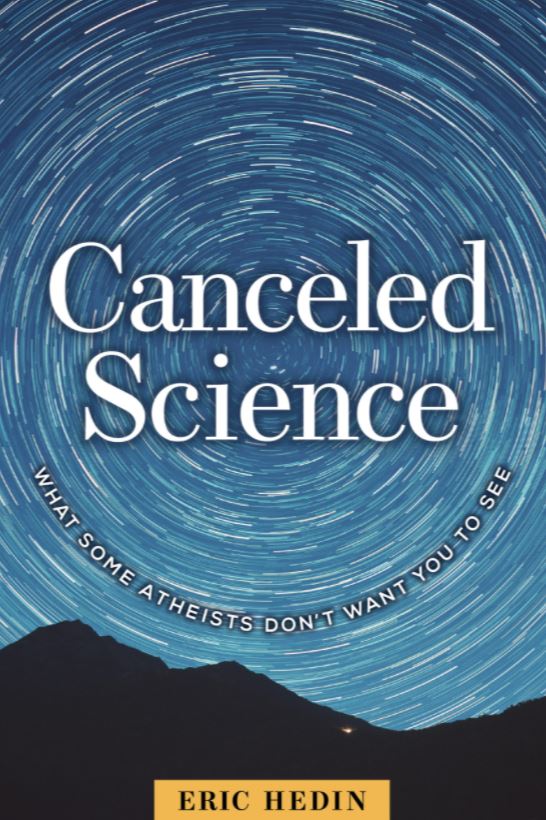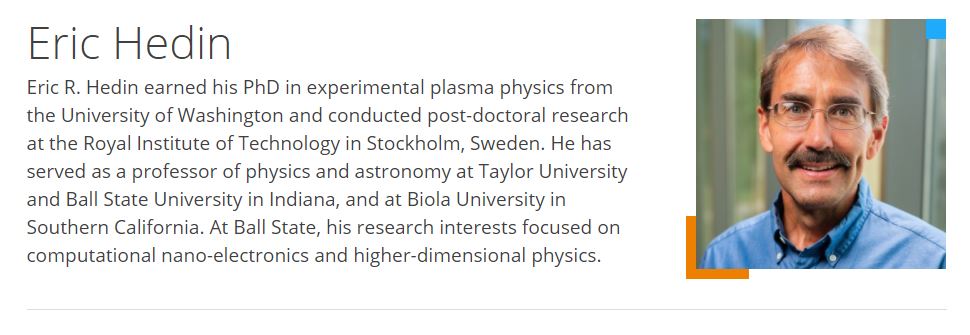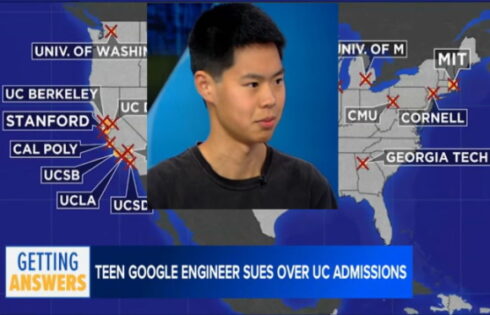
‘Canceled Science: What Some Atheists Don’t Want You to See’
Physicist Eric Hedin was canceled before the term cancel culture was even coined.
He taught a very popular class at Ball State University for six years called “Boundaries of Science” before pressure from atheists in 2013 prompted campus leaders to cancel the course.
Hedin never taught “Boundaries of Science” at Ball State again, but he continued teaching physics there and even got tenure. Eventually he left the Indiana campus to take a job at Biola University, a private Christian school in Southern California.
More recently Hedin has revisited the Ball State experience that thrust his name into the national spotlight and made him the poster boy for intelligent design for a season. Earlier this year he published the book “Canceled Science: What Some Atheists Don’t Want You to See.”
 “Canceled Science tells the dramatic story of the atheist campaign to cancel Hedin’s course, reveals the evidence the atheists tried to bury, and explores discoveries that have revolutionized our understanding of the nature and origin of matter, space, and even time itself,” the online book description states.
“Canceled Science tells the dramatic story of the atheist campaign to cancel Hedin’s course, reveals the evidence the atheists tried to bury, and explores discoveries that have revolutionized our understanding of the nature and origin of matter, space, and even time itself,” the online book description states.
Hedin, in an interview with The College Fix on Tuesday, said his book comes at a time when there’s more evidence than ever for intelligent design.
(The following Q&A has been edited for length and clarity)
As the title of your book suggests, what is it that atheists don’t want us to see?
Evidence that points to something beyond nature as being responsible for major aspects of our universe, in particular the origin of the universe. The laws of nature all seem to be finely tuned to a value that of course allows life, but there’s some razor sharp or knife-edge tuning to these parameters that really can’t be explained by saying, “Oh, it’s just luck.” The level of biological information that is within the cell far exceeds what can be attained by any natural process we can think of, and actually there are laws of physics that claim that natural processes cannot generate that level of complexity that is functional, specific, information-rich, resembling machines, architecture and coding. There’s also the esoteric aspects of human nature: a mind, a consciousness, emotions, a spiritual sense. These go beyond what can be explained by appealing to random interactions between particles guided by the push-pull forces that we find in nature. We see the universe, we look at it, we study it, and we find evidence of intelligent design. The more we study nature, the more evidence for something beyond nature comes into the picture.

Do people who have not studied this issue in depth truly understand the mathematical enormity of the fine-tuning argument? It’s not just “the chances are low” that life arose by chance.
Honestly, as a physicist I would be willing to say the physical reality chance of life originating on its own by natural processes within this universe is zero, not just low. It’s because the universe is not infinitely big. There is a finite universe. We don’t have an infinite amount of time, the universe has a finite age, roughly 13.8 billion years. That limited time, limited spatial extent of the universe means that there’s a limited amount that any natural randomness could generate. The probabilistic resources of our universe fall short of what is necessary to develop even one large functional protein molecule that would be just one of tens of thousands of different protein molecules that are needed for human life to exist. It’s almost to me desperate to keep trying to think that this could have happened by chance.
It’s been said that it takes more faith to be an atheist. Why do your peers in the scientific community ignore all the evidence that points to design in life and nature?
Atheism has some similarities to a religion. The teaching of evolution and the teaching of naturalism is ingrained in the sciences and the educational system. There are people who want to keep it that way because they know if it didn’t happen naturally, then it’s happening supernaturally, and that opens the door for a divine designer and they are very opposed to that. A lot of times they think, “Well, we just need to keep studying and we will find some, almost vital force, some emergent system of complexity that explains it all naturally, even though what we already know dictates against that.” That was why I called my course at Ball State “Boundaries of Science.” There are boundaries to what nature can accomplish naturally.
Who should read your book?
I wrote the book to appeal to a broad audience. It has a high school-plus level of assumption of scientific literacy. It’s not a textbook filled with equations. It’s heavily resourced and references scientific literature, so it’s not just my own ruminations. I particularly hope that people would read it who wonder what is the scientific evidence just in general for something beyond naturalism. I also think it can be very useful for people of faith who believe that there’s a God behind the universe and origin of life but are unsure how to navigate science that they may pick up from popular media or a course they took in high school or college. I believe it can be a faith-strengthening read for people who may approach it from that angle.
The intelligent design movement does not endorse a particular religion per se, just that all this could not have happened by accident, correct?
That is the main thrust, although my own personal conviction is that the designer is the God of the Bible. That comes through in a few places in the book but I don’t start with that.
Is there a place for Christian scientists? How do students who attend a Christian university and major in science forge a career?
A lot of scientific research is neutral with regard to faith and God and origins. If you are an engineer trying to design some system, you just need to know the practicalities, and we teach that. Even within biological research a lot of the day-to-day, nitty-gritty research, you just better know your stuff, your biochemistry, and the interactions, and how things work at the cellular level. [Christian universities] teach all that.
Is there an example of a scientific breakthrough that came about thanks to a stance in support of intelligent design?
It used to be the idea that DNA was composed of a lot of “junk DNA” and that was considered to be evidence for evolution, it was thought to be left over relics. Some atheists made a big point of that. But I believe you can point to certain researchers committed to intelligent design and the belief that that’s how our life and our cells came into existence who persisted in suggesting that if we study junk DNA those portions of the DNA that are considered junk, we should actually find something that’s useful, maybe we don’t understand it yet. Well, it turns out, that’s the case! Part of the junk DNA that turned out to be important tells the cellular mechanisms when to turn on and when to turn off, it’s kind of a control sequence.
The College Fix has featured professors from respected secular institutions that have questioned a natural origin of the universe, including Yale University’s David Gelernter, University of Oklahoma’s Michael Strauss and Rice University’s James Tour. We’ve also reported on how over 1,000 scientists — including many past and current professors from various institutions — have signed “A Scientific Dissent From Darwinism.” Is there a growing acceptance of intelligent design?
I have heard some things that indicate that there is a greater degree of acceptance, maybe not across the board but at least being admitted in some scientific peer-reviewed articles. Other scientists who maybe once adhered to Darwin are dissenting. So I believe the evidence is having an effect. After a while you get tired of trying to ramrod something against the evidence and I think that this idea of naturalism just doesn’t add up with what we continue to discover.
MORE: Physics professor tells students scientific evidence points to a ‘designer’
IMAGE: NASA
Like The College Fix on Facebook / Follow us on Twitter






Please join the conversation about our stories on Facebook, Twitter, Instagram, Reddit, MeWe, Rumble, Gab, Minds and Gettr.